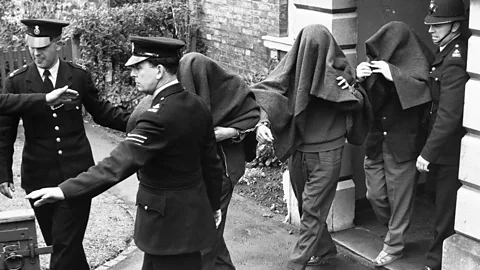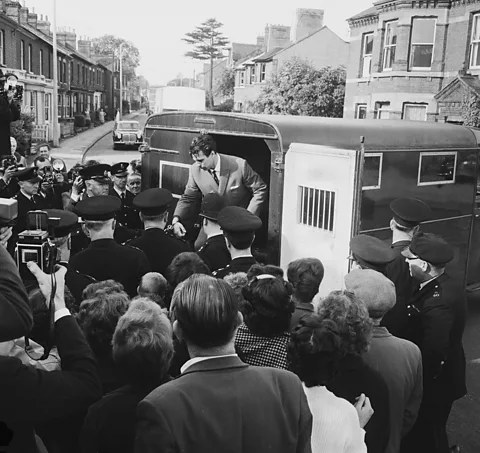'The elite of the criminal world': The men behind the Great Train Robbery
 Getty Images
Getty ImagesBritain in the 1960s was captivated by the daring of the Great Train Robbery, and the sheer scale of the money stolen. But when the accused men stood trial in April 1964, the judge was determined to send a message that such crimes would not be tolerated. Fourteen years later, several of the convicts talked to the BBC.
On 16 April 1964, Robert Welch was one of the 12 men found guilty of a notorious heist in Aylesbury Crown Court. Fourteen years later, in 1978, he was on the BBC's documentary and current affairs programme, Man Alive, and recalled seeing local dignitaries jostle for positions in the courtroom to hear the sentencing. "This was what they had all come to watch. The climax of the play, the drama," Welch said. "And the medieval setting in which we were sentenced, you know, it was a bit chilling."
Welch and his fellow convicts had fallen a long way since pulling off one of the most audacious and lucrative thefts the UK had ever seen: the Great Train Robbery.
Welch and his co-defendants were part of a band who held up a Royal Mail night train travelling from Glasgow to London. The robbers had made off with £2.6m in used banknotes, a record haul at that time, and the equivalent of over £50m ($65.8m) today. At the time of Welch's trial, police were still hunting for three of the people they suspected had been involved in the crime.
To execute this carefully orchestrated robbery, 15 members of two of London's biggest criminal gangs had worked together, each tasked with a particular role in the plot. "They were regarded as the elite of the criminal world," Reginald Abbiss, who had covered the crime for the BBC as a young reporter, told the Witness History podcast in 2023. "You had to have a certain talent and audacity, certain abilities to be able to pull a heist of this magnitude and they came together because they needed a multitude of talent."
The daring robbery took place just after 03:00 on 8 August 1963. The first step the criminals had taken was to cut the phone lines to stop an alarm being raised. They then rigged the train signals to stay red. "They put a glove over the green light, they wired a cheap battery up to the red light and this, of course, meant the driver had to slow up," said Abbiss.
Seeing the red light, the train's driver, Jack Mills, stopped the engine, and his co-driver, David Whitby, climbed out to use the trackside phone to find out what the problem was. That's when Whitby discovered that the line had been cut, and he was set upon by masked men wearing boiler suits. In the meantime, a masked robber burst into the train's cab to restrain the driver. When Mills tried to put up a fight, another gang member hit him over the head, rendering him semi-conscious.
"The one glitch, if you like, was the fact that the train driver… tried to resist," said Abbiss. "One of the robbers hit him on the head with a cosh. A lot of blood and down he went."
The gang had been given inside information that the cash and high-value packages were held in the train's front two coaches. And because it was a Bank Holiday weekend, it would be carrying more money than usual.
 Getty Images
Getty ImagesOne hundred and twenty sacks of money
Although there weren't any police onboard, there were more than 70 Post Office employees, mostly in the rear carriages, where they were busy sorting letters. The criminals who had already familiarised themselves with the train's operation and layout quickly uncoupled the two money-laden carriages. The plan was to detach them and drive them away from the steep embankment to a predetermined rendezvous where it would be easier to unload the bags of cash.
It was then they hit a problem. "They had a driver to drive the train, he couldn't get the train going, and they had to pull the original driver, Jack Mills, up from the floor and threaten him and say, 'Drive the train,'" said Abbiss. "He managed to get the train a mile up the line to where most of the gang were waiting, leaving the other eight or nine coaches with sorters happily sorting, totally unaware that the main part of the train had gone on ahead."
Mills, still bleeding profusely, was told to stop the two front carriages at Bridego Bridge. There, the rest of the gang broke into the carriages, overpowering the Post Office staff working in them, and forcing them to lie face down on the floor. They also brought in Mills and Whitby, who were handcuffed together.
The gang had decided that they would give themselves just 15 minutes to unload the loot and then leave whatever money was left. They formed a human chain and swiftly removed 120 sacks containing two-and-a-half tonnes of money into parked Land Rovers. After a quarter of an hour, the crew called time and ordered the terrified Post Office staff to stay still and not to attempt to contact the police for 30 minutes. Then the robbers drove off into the night.
The boldness of the theft and the enormous sum of money involved captured the British public's imagination. In the weeks that followed, the country was gripped by sensational headlines detailing the police's hunt for the perpetrators. But despite the meticulous nature of the robbery's planning and its skilful execution, within a year the majority of the criminal gang had been rounded up and were facing trial.
"Well, at first view, the job was a very well-planned job," ex-Det Supt Malcolm Fewtrell, who led investigations into the heist, told BBC News in 1964. "But in the event, it has been a disaster. They obviously weren't so clever as they thought they were."
The judge at their trial did not view the robbers' actions in the "romantic" way some of the public seemed to, saying that it would be "positively evil" if he showed the convicted men any semblance of leniency.
Crime and punishment
"I remember a shock wave ran through the courtroom when the judge, a man called Lord Justice Edmund Davies, handed down 307 years in the space of half an hour," Abbiss told BBC Witness History in 2023. At the time, the punishments they received for the robbery were some of the harshest in British criminal history, especially since nobody had been killed and no firearms had been used.
"I was just numbed, I couldn't think of anything but 30 years. When are we going to get out? We are never going to get out," one of the robbers, Tommy Wisbey, told Man Alive in 1978.
"I don't think it really hits you until a couple of days later and you realise what you've got," fellow gang member Gordon Goody said to the BBC. "I mean it was a bit of a joke downstairs, clowning around and all that kind of thing. But deep down, I suppose you were sick."
More like this:
• The British politician who was caught faking his own death
The reason the judge gave for the severity of the prison terms was the assault on Mills. "Anybody who has seen that nerve-shattered engine driver can have no doubt of the terrifying effect on law-abiding citizens of a concerted assault by armed robbers," said Justice Davies at the trial. Mills never worked again and died in 1970 of leukaemia. His co-driver Whitby died of a heart attack the following year at the age of 34.
In History
In History is a series which uses the BBC's unique audio and video archive to explore historical events that still resonate today. Subscribe to the accompanying weekly newsletter.
But there was also a sense, at least among the robbers themselves, that they were being disproportionately punished because the heist had embarrassed the British establishment. One of them, Roy James, said to the BBC in 1978, "At that moment, all the shame that was with me throughout the trial was lifted because I felt that Mr Edmund Davies then used his position as a High Court judge, used the backing of the state for vengeance. He put himself on a par with me and everything that he said I was."
"There was a feeling that Justice Davies came down particularly hard for two reasons," said Abbiss. "One was the violence shown against the train driver, and the other was that the establishment, the government, the Post Office and British Rail, the way that they were sort of caught with their pants down. It showed the establishment to be people perhaps who take their eye off the ball."
The criminals' notoriety only grew following their sentencing when two of the gang made dramatic escapes from prison. Charles Wilson, who had been the treasurer of the group, broke out of jail just four months after the trial. He was recaptured in Canada after four years on the run and served another 10 years behind bars. Ronnie Biggs escaped from London's Wandsworth Prison, 15 months after his sentencing, using a makeshift rope ladder. He underwent plastic surgery and lived at times in Spain, Australia and Brazil, evading arrest for nearly 40 years. In 2001, he voluntarily returned to the UK for medical treatment and served the rest of his prison sentence.
On the run
The law would also eventually catch up with the three gang members who didn't stand trial that day. Bruce Reynolds, considered to be the robbery's mastermind, spent five years on the run until he was arrested on his return to England. He was sentenced to 25 years in jail, but ended up serving just 10. His son Nick, who spent his early life on the run with his father in Mexico and Canada, would later have his own link to the outlaw lifestyle when his band Alabama 3's song Woke Up This Morning became the opening theme of The Sopranos TV series.
Ronald "Buster" Edwards, who was later played by Genesis singer Phil Collins in a 1988 film, Buster, fled to Mexico following the robbery. He gave himself up in 1966 and was released after serving nine years. James White, who acted as the quartermaster for the robbery, was caught in Kent and sent to prison after three years on the run. He was released in 1975.
Despite the lengthy jail time handed down, all the men convicted of the Great Train Robbery would end up being released early. None served more than 13 years for the crime – although many of them would return to prison for different offences in the years that followed.
As for the huge haul stolen during the robbery, despite the police in 1964 offering a 10% share for information that would lead them to it, the majority of the money was never recovered.
--
For more stories and never-before-published radio scripts to your inbox, sign up to the In History newsletter, while The Essential List delivers a handpicked selection of features and insights twice a week.
